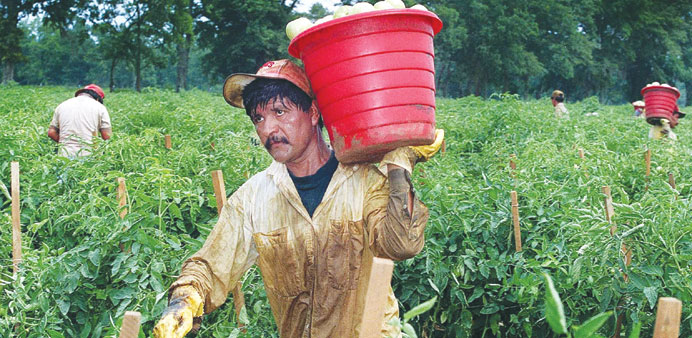|
The last fast-food hamburger you ate may have cost you next to nothing. But what did the tomato slice on that burger cost the worker who got it there? Almost anywhere in the world – including in the United States – the cost can be shockingly high. |
Appalling wages are just the start. In Florida, tomato pickers earn an average of just $0.50 for every 14.5-kilogram bucket.
A worker who picks all day – backbreaking labour that starts before dawn – is lucky to earn $10,500 a year, placing him below the poverty line.
Then there are the alarming human-rights violations. In Mexico, authorities recently freed almost 300 people, including 39 teenagers, who were being “held in slave-like conditions at a camp where tomatoes are sorted and packed for export”.
US federal authorities have called Florida’s tomato fields “ground zero for modern-day slavery”. The abuses of farm workers by agribusiness interests there have been serious and systematic.
Enter the Campaign for Fair Food – a fight for better wages and conditions that Florida tomato pickers and their allies have fought and largely won. Their struggle not only underscores the obstacles confronting workers’ organisations in an era of outsourcing and global supply chains, but also might serve as a model for workers in other industries.
For many years, the tomato industry in Florida depended on poor white and African American labourers. Today, it relies mainly on low-wage farmworkers from Haiti, Mexico, Guatemala and other Central American countries – a change that owes much to two decades of trade liberalisation.
Policies like the North American Free Trade Agreement allowed multinational companies to sell cheap produce in Mexico and other countries, undercutting local farmers and driving millions of people off their land.
In search of employment, many migrated to the US, where, as disempowered labourers, they went to work for the same (or similar) multinationals.
But globalisation is now affecting the tactics that farmworkers have chosen. As Jake Ratner, a young activist who works for Just Harvest USA, points out, global corporations are often insulated from traditional tactics like boycotts.
So farmworkers and their allies have chosen a novel “brand-busting” approach that targets companies’ public image – and that has gotten the attention of decision-makers at the top of the global food hierarchy.
The Campaign for Fair Food’s agenda is to persuade every major tomato purchaser to sign on to the Fair Food Programme, which, for a small premium – a penny per pound – changes the lives of workers and their families’ substantially.
Under the FFP, workers who were paid $0.50 cents per 32-pound bucket (a rate that has not risen in more than 30 years) receive $0.82 – a 64% increase. A third-party organisation, the Fair Food Standards Council, monitors the industry for compliance with wage and human-rights standards.
Before the FFP was launched in November 2010, Florida’s powerful tomato industry had long resisted increasing the per-bucket rate or signing on to codes of conduct to safeguard workers against abuses.
That changed when activists began targeting the multinational corporations at the top of the pyramid, rather than the growers (who are now merely middlemen squeezed by global companies).
As a result, 11 of the biggest global food corporations that buy their tomatoes from Florida growers – including McDonald’s, Taco Bell and Burger King and supermarket chains like Whole Foods and Trader Joe’s – have adopted the FFP.
The FFP has not only lifted workers’ wages. A confidential complaint hotline enables workers to report human-rights violations; more than 300 calls have been received since 2011 (all were investigated and the vast majority were resolved).
And corporations that sign on to the FFP also commit to a zero-tolerance policy for forced labour, which creates a market incentive for their growers to police their own operations actively; in the past, market forces created an incentive to look the other way.
Likewise, before the FFP, Florida tomato workers had to wake up at three or four in the morning to get on buses and be in the fields the minute that orders came in. But they often were not allowed to start picking until 2-3 hours later, when the dew on the plants dried – time for which they were not paid.
Now, with the introduction of FFP-mandated time clocks, workers can punch in and record their hours, ensuring that at least they will receive the state’s minimum wage. As a result, growers no longer want them starting so early, which gives them more time to sleep – and have breakfast with their families.
Without such programmes, the multinational squeeze goes on. By leveraging their massive purchasing power, big multinational food corporations drive down prices, not only impoverishing farmworkers, but also eroding the profits of the growers who employ them. Meanwhile, the disaggregation and “disintermediation” of global corporations enables them to create formal barriers that prevent senior management from ever seeing, let alone being influenced by, their own workers (and growers).
I experienced this firsthand when I joined a protest organised by the Coalition of Immokalee Workers against a Wendy’s fast-food outlet in New York City’s Union Square. (Though four of the five largest US fast-food corporations have signed on to the FFP, Wendy’s is the holdout.) Citing company policy, Wendy’s managers refused even to accept a letter from the protesters about signing on to the FFP and gave them the telephone number of Wendy’s corporate spokesperson. Activists say that calling that number elicits a form-letter statement, and that no one ever speaks with them directly.
Nonetheless, the FFP campaigners may eventually get Wendy’s to sign on – making that tomato slice a little tastier for customers with a conscience.
Perhaps more important, building a coalition of workers, consumers and allied activists to apply pressure at the top could be a model for positive change for workers in globalised industries in India, Bangladesh, China and elsewhere.-Project Syndicate
♦ Naomi Wolf is a political activist and social critic.

